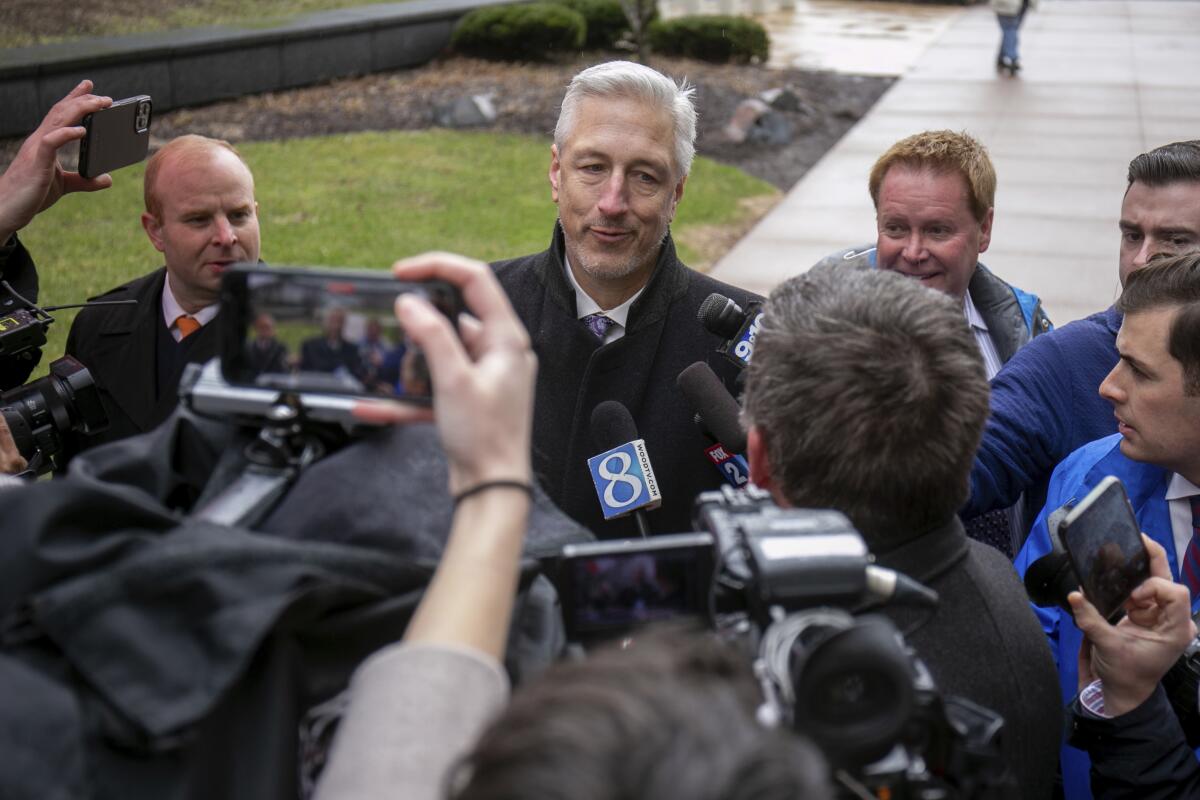In Whitmer plot case, was it violent political rhetoric or just ‘rough talk’?

- Share via
Outside the Michigan courthouse where a jury did not convict any of the four men charged with planning to kidnap Gov. Gretchen Whitmer, a defense lawyer said jurors saw the case as what it was: dirty FBI tactics and “rough talk.”
The men didn’t say anything shocking, attorney Michael Hills said, though they were heard on audio played during the trial talking about killing Whitmer, blowing up a bridge and other acts of violence or sabotage. He said one potential defense witness was prepared to testify that he’d “heard worse from pregnant mothers up on the Capitol.”
“If I don’t like the governor, and it’s rough talk, I can do that in our country. That’s what’s beautiful about this country. That’s what’s great about it,” Hills said. “So hurrah, freedom in America. It’s still here.”
But to others, Friday’s outcome after a weeks-long trial was a chilling reminder that political violence across the U.S. too often goes unpunished.
They say that the plan to abduct Whitmer, as well as the Jan. 6 insurrection at the U.S. Capitol and attacks on social media and elsewhere that disproportionately affect female lawmakers, make clear that people are increasingly angry and feeling emboldened to act on it.
Whitmer, a Democrat, has blamed former President Trump for stoking anger over COVID-19 restrictions and refusing to condemn right-wing extremists. On Friday, her office said people across the country are experiencing “a normalization” of violence.
“The plot to kidnap and kill a governor may seem like an anomaly. But we must be honest about what it really is: the result of violent, divisive rhetoric that is all too common across our country,” Whitmer’s chief of staff, JoAnne Huls, said in a statement. “There must be accountability and consequences for those who commit heinous crimes. Without accountability, extremists will be emboldened.”
Whitmer has not commented publicly on the outcome of the case. She did not testify or attend the trial.
Adam Fox, Barry Croft Jr., Brandon Caserta and Daniel Harris were arrested in the case in October 2020. Federal prosecutors said they wanted to kidnap Whitmer because they were angry over pandemic restrictions she had imposed and saw her as a “tyrant” who needed to be removed.
The charges came at a particularly divisive time, with debate raging over the pandemic and just weeks before the 2020 presidential election between Trump and Joe Biden. Armed protests were occurring at the Michigan Capitol and elsewhere in the U.S., and in many cities, demonstrations over the police murder of George Floyd turned violent at times.
Prosecutors in the Michigan trial presented evidence from undercover agents, an FBI informant and two men who pleaded guilty to the plot. Jurors also heard secretly recorded conversations and read violent social media posts and messages.
Defense attorneys argued that the men were entrapped by the FBI, pulled into an alleged plot they would never have participated in if not for the government and its informants luring them. They painted their clients as wannabes who were frequently high and easily influenced, and one as a former member of the military who wanted to brush up on his firearm training.
Before returning their verdicts, the jury said that after nearly five days of deliberations, they could not agree unanimously on all 10 of the charges against the men.
Harris, 24, and Caserta, 33, were found not guilty of conspiracy. Harris also was acquitted of charges related to explosives and a gun.
The jury could not reach verdicts for Fox, 38, and Croft, 46, which means the government can put them on trial again.
U.S. Atty. Andrew Birge said after the verdicts, “We have two defendants that are awaiting trial, and we’ll get back to work on that.”
Hills, who defended Caserta, said the outcome was a message to the government that the FBI’s actions were “unconscionable.” He said the federal government should “let it go” rather than take Croft and Fox to trial a second time.
Rep. Marjorie Taylor Greene (R-Ga.) tweeted after the verdict that the “FBI and DOJ need a complete and total cleansing. ... All the rot must be removed and these agencies must be restored.”
Others, stunned by the jury’s decision, said it set a dangerous example.
U.S. Rep. Debbie Dingell (D-Mich.) called for an end to “the hatred and division in this country” and said she was “deeply concerned that today’s decision in the Whitmer kidnapping trial will give people further license to choose violence and threats.”
Michigan Lt. Gov. Garlin Gilchrist called on elected officials, parents, teachers and others to stand up to such “hateful actions” and to “teach our kids that there is a better way.”
“Our differences must be settled at the ballot box, not through violence,” he said. “We need to be honest and clear about what causes violence by extremists and do all we can to address the root cause of it.”
Michigan state Rep. Laurie Pohutsky, a Democrat from Livonia, noted on Twitter that a man who threatened to kill her in 2020 was acquitted.
“The next time you ask why we can’t get good people to run for office, consider today’s verdict,” she said, adding: “This won’t be taken seriously until someone dies.”
More to Read
Get the L.A. Times Politics newsletter
Deeply reported insights into legislation, politics and policy from Sacramento, Washington and beyond. In your inbox twice per week.
You may occasionally receive promotional content from the Los Angeles Times.










